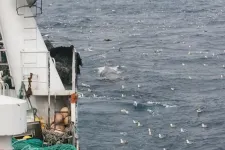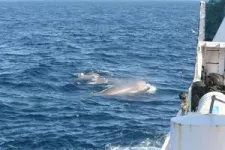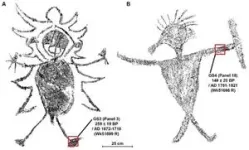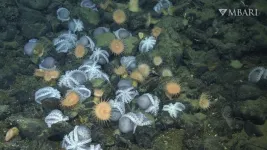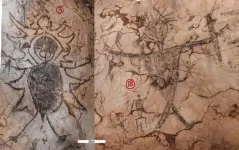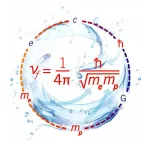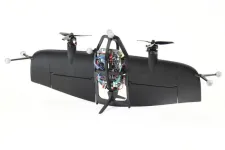(Press-News.org) Sperm and northern bottlenose whales were frequently observed following a trawler off the coast of Newfoundland to feed on fish escaping from the net as it was hauled in, according to a study published August 23, 2023 in the open-access journal PLOS ONE by Usua Oyarbide from Plentzia Marine Station–Univ Basque Country, Spain, and colleagues.
In this study, the authors looked at how cetaceans interacted with a deep-sea trawler fishing in the western North Atlantic off the coast of Newfoundland in 2007. Oyarbide tracked whale encounters over 50 days between July 20 and September 13, 2007, while onboard the trawler as a North Atlantic Fisheries Organization observer.
Sperm whales (Physeter macrocephalus) were seen in 129 encounters and northern bottlenose whales (Hyperoodon ampullatus) in 86 encounters directly interacting with the ship in areas where the trawler was fishing for Greenland halibut (Reinhardtius hippoglossoides). The whales weren’t observed when the trawler was fishing redfish (Sebastes sp.) thorny skate (Raja sp.), or any other fish species the trawler took, suggesting halibut was the fish of choice for both species. The longest sighting of a sperm whale (one hour and twenty minutes of continuous observation) occurred while the trawling net was being towed across the ocean bed to catch fish—in general, during towing, sperm whales (but not northern bottlenose whales) were often seen swimming parallel to the ship and surfacing or breaching. When the full fishing net was hauled in, both sperm and northern bottlenose whales were sighted swimming behind the net and/or surface feeding on escaped fish, with the majority of whale observations happening during hauling. Five of the ten sperm whales who were observed near the ship were spotted in repeat encounters, traveling up to 235 km away from where they were originally observed as the ship fished new areas for halibut.
While other studies at Greenland halibut fisheries have described sperm and northern bottlenose whales feeding primarily on offal and discards, this was not observed on this specific vessel, where both whale species primarily fed on live (albeit dazed) halibut escaping from the net during hauling—suggesting that perhaps differences in fishing practices across regions or over time may change whale behavior when associating with ships. The authors note that more research on interactions between whales and fisheries in this area are needed, as the implications and possible risks (e.g., entanglement or fisher retaliation) for whales are unknown.
The authors add: “Our research provides new insights into the behavior of sperm and northern bottlenose whales around a commercial fishing vessel targeting Greenland halibut.”
#####
In your coverage please use this URL to provide access to the freely available article in PLOS ONE: https://journals.plos.org/plosone/article?id=10.1371/journal.pone.0289626
Citation: Oyarbide U, Feyrer LJ, Gordon J (2023) Sperm and northern bottlenose whale interactions with deep-water trawlers in the western North Atlantic. PLoS ONE 18(8): e0289626. https://doi.org/10.1371/journal.pone.0289626
Author Countries: Spain, Canada, UK
Funding: An emerging explorer grant from National Geographic (#4711-6) and funding from Fisheries and Oceans Canada supported fieldwork conducted by LF in the study area between 2015-2017. The funders had no role in study design, data collection and analysis, decision to publish, or preparation of the manuscript.
END
Opportunistic sperm and northern bottlenose whales frequently observed swimming behind deep-sea trawler net to feed on escaping fish
The whales were only spotted when the catch was Greenland halibut, not redfish or thorny skate
2023-08-23
ELSE PRESS RELEASES FROM THIS DATE:
Scientists solve mystery of why thousands of octopus migrate to deep-sea thermal springs
2023-08-23
In 2018, researchers from NOAA’s Monterey Bay National Marine Sanctuary and Nautilus Live observed thousands of octopus nesting on the deep seafloor off the Central California coast. The discovery of the “Octopus Garden” captured the curiosity of millions of people around the world, including MBARI scientists. For three years, MBARI and collaborators used high-tech tools to monitor the Octopus Garden and learn exactly why this site is so attractive for deep-sea octopus.
In a new study published today in Science Advances, a team of researchers from MBARI, NOAA's Monterey Bay National Marine Sanctuary, Moss Landing Marine Laboratories, the University ...
Malaysian rock art found to depict elite–Indigenous conflict
2023-08-23
A team of researchers led by the Griffith Centre for Social and Cultural Research in collaboration with The Sarawak Museum Department have become the first to date drawings of Gua Sireh Cave in Sarawak, uncovering a sad story of conflict in the process.
The limestone cave of Gua Sireh in western Sarawak (Malaysian Borneo) is famous for the hundreds of charcoal drawings lining the walls of its main chambers, attracting hundreds of visitors each year.
Approximately 55km southeast of Sarawak’s Capital, Kuching, the site is managed by the Bidayuh (local Indigenous peoples) in collaboration with The Sarawak Museum Department, ...
How a cup of water can unlock the secrets of our Universe
2023-08-23
Researchers from Queen Mary University of London have made a discovery that could change our understanding of the universe. In their study published in Science Advances, they reveal, for the first time, that there is a range in which fundamental constants can vary, allowing for the viscosity needed for life processes to occur within and between living cells. This is an important piece of the puzzle in determining where these constants come from and how they impact life as we know it.
In 2020, the same team found that the viscosity of liquids is determined by fundamental physical constants, setting a limit on how runny a ...
How neurons grow comfortable in their own skin
2023-08-23
Nerve cells that sense touch grow the appropriate endings for hairy or hairless skin based on cues from the skin itself, rather than through predetermined programming, according to research led by Harvard Medical School scientists and published Aug. 21 in Developmental Cell.
If affirmed in further studies, the findings could eventually help researchers develop therapies to regenerate damaged or diseased nerves, the authors say, or better understand what goes awry in congenital neuropathies, conditions in individuals born with ...
A better understanding of myalgic encephalomyelitis/chronic fatigue syndrome could benefit long COVID patients
2023-08-23
Amsterdam, August 23, 2023 – While myalgic encephalomyelitis/chronic fatigue syndrome (ME/CFS) and Long COVID are not the same disease, they appear to have features of overlapping biological and symptomatic presentations. Many people with Long COVID meet the diagnostic criteria of ME/CFS. Long COVID scientists and clinicians could expedite research and care protocols by utilizing information and experiences gained from the ME/CFS community. A special section of WORK: A Journal of Prevention, Assessment & Rehabilitation aims to provide a ...
Insights from fully sequencing 43 human Y chromosomes
2023-08-23
Highly challenging to sequence and long overlooked, the human Y chromosome’s contributions to health and disease remain largely unknown. A new paper that presents, for the first time, the complete sequences of multiple human Y chromosomes from lineages from around the globe provides an essential step forward in understanding the roles of the Y chromosome in human evolution and biology.
Even as the field of human genomics forged ahead at an astonishing pace, the Y chromosome— one of the ...
Interdisciplinary Lehigh University team awarded NSF grant to train future energy leaders
2023-08-23
A team of interdisciplinary researchers led by Arindam Banerjee, professor and chair of the Mechanical Engineering and Mechanics Department at Lehigh University, has been awarded nearly $3 million from the National Science Foundation to train a diverse group of future energy-sector leaders across academia, industry, government and policy organizations.
The five-year award will allow Lehigh to establish a SEED (Stakeholder Engaged, Equitable, Decarbonized) Energy Futures Training Program to provide graduate students with the skills needed to explore, collaborate and pioneer solutions to the society’s reliance on carbon-based energy sources and energy inequities. ...
Carnegie Mellon University announces new Director of the Language Technologies Institute
2023-08-23
Mona Diab understands what is at stake.
As a research scientist at two of the largest technology companies on the planet, Diab saw the impact innovations had as they spread across the globe. And with artificial intelligence poised to usher in the greatest technological leap since the internet, Diab wants to train, teach and prepare students, researchers, scientists and communities to think responsibly about these new tools.
"We're living in a world of proliferating AI and generative AI. There ...
Planning algorithm enables high-performance flight
2023-08-23
A tailsitter is a fixed-wing aircraft that takes off and lands vertically (it sits on its tail on the landing pad), and then tilts horizontally for forward flight. Faster and more efficient than quadcopter drones, these versatile aircraft can fly over a large area like an airplane but also hover like a helicopter, making them well-suited for tasks like search-and-rescue or parcel delivery.
MIT researchers have developed new algorithms for trajectory planning and control of a tailsitter that take advantage of the maneuverability and versatility of this type of aircraft. Their algorithms ...
Clinical trial studying possible new treatment option for patients with NAFLD
2023-08-23
According to the National Institutes of Health, approximately 24% of adults in the United States have nonalcoholic fatty liver disease (NAFLD), an umbrella term for a range of liver conditions affecting people who drink little to no alcohol that can lead to cirrhosis, liver cancer and liver failure.
Currently, there are no medications approved by the U.S. Food and Drug Administration (FDA) to treat NAFLD.
A recent $9.57 million grant awarded to researchers with the UC San Diego NAFLD Research Center at University of California San Diego School of Medicine will support a clinical trial to study a new treatment option for patients ...
LAST 30 PRESS RELEASES:
Cal Poly’s fifth Climate Solutions Now conference to take place Feb. 23-27
Mask-wearing during COVID-19 linked to reduced air pollution–triggered heart attack risk in Japan
Achieving cross-coupling reactions of fatty amide reduction radicals via iridium-photorelay catalysis and other strategies
Shorter may be sweeter: Study finds 15-second health ads can curb junk food cravings
Family relationships identified in Stone Age graves on Gotland
Effectiveness of exercise to ease osteoarthritis symptoms likely minimal and transient
Cost of copper must rise double to meet basic copper needs
A gel for wounds that won’t heal
Iron, carbon, and the art of toxic cleanup
Organic soil amendments work together to help sandy soils hold water longer, study finds
Hidden carbon in mangrove soils may play a larger role in climate regulation than previously thought
Weight-loss wonder pills prompt scrutiny of key ingredient
Nonprofit leader Diane Dodge to receive 2026 Penn Nursing Renfield Foundation Award for Global Women’s Health
Maternal smoking during pregnancy may be linked to higher blood pressure in children, NIH study finds
New Lund model aims to shorten the path to life-saving cell and gene therapies
Researchers create ultra-stretchable, liquid-repellent materials via laser ablation
Combining AI with OCT shows potential for detecting lipid-rich plaques in coronary arteries
SeaCast revolutionizes Mediterranean Sea forecasting with AI-powered speed and accuracy
JMIR Publications’ JMIR Bioinformatics and Biotechnology invites submissions on Bridging Data, AI, and Innovation to Transform Health
Honey bees navigate more precisely than previously thought
Air pollution may directly contribute to Alzheimer’s disease
Study finds early imaging after pediatric UTIs may do more harm than good
UC San Diego Health joins national research for maternal-fetal care
New biomarker predicts chemotherapy response in triple-negative breast cancer
Treatment algorithms featured in Brain Trauma Foundation’s update of guidelines for care of patients with penetrating traumatic brain injury
Over 40% of musicians experience tinnitus; hearing loss and hyperacusis also significantly elevated
Artificial intelligence predicts colorectal cancer risk in ulcerative colitis patients
Mayo Clinic installs first magnetic nanoparticle hyperthermia system for cancer research in the US
Calibr-Skaggs and Kainomyx launch collaboration to pioneer novel malaria treatments
JAX-NYSCF Collaborative and GSK announce collaboration to advance translational models for neurodegenerative disease research
[Press-News.org] Opportunistic sperm and northern bottlenose whales frequently observed swimming behind deep-sea trawler net to feed on escaping fishThe whales were only spotted when the catch was Greenland halibut, not redfish or thorny skate
